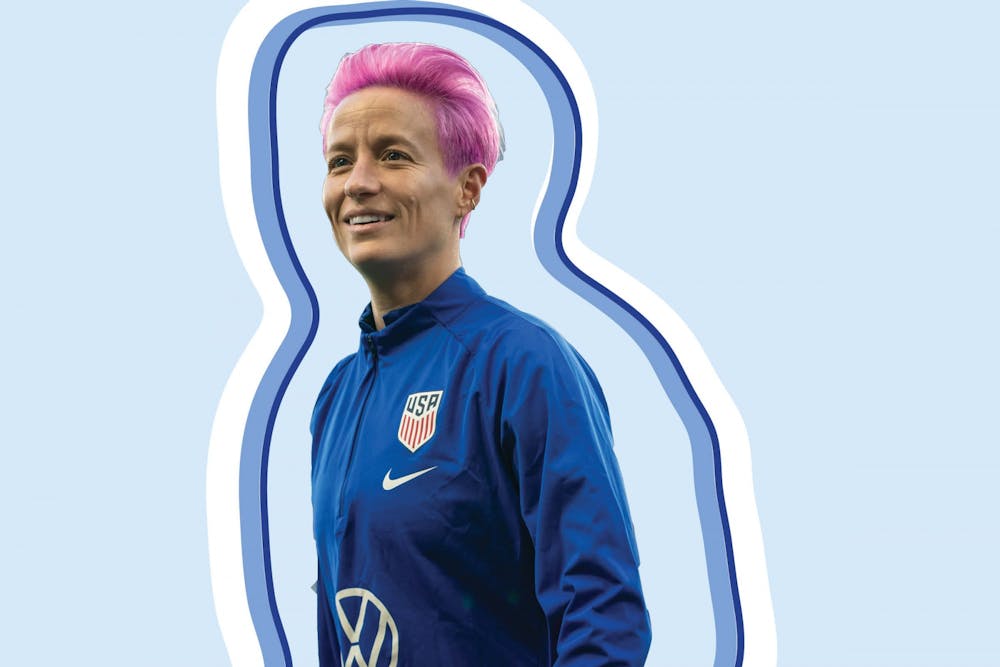When many people hear "Victoria’s Secret," the brand name tends to conjure up images of the retailer's iconic, yet controversial, so–called Angels. This elite group of tall, thin supermodels is famous for donning extravagant wings, G–string thongs, and jewel encrusted push–up bras while strutting down the runway in the annual Victoria’s Secret Fashion Show. Their photos are plastered on the walls of all of the company's stores.
Arguably, it's hard to imagine what Victoria's Secret might look like without these models and their unattainable looks. But recently, Victoria's Secret said goodbye to their Angels. Battling harsh criticism for their promotion of "patriarchal, sexist" and "really harmful" standards of beauty, the lingerie giant has begun an aggressive rebranding journey.
In place of the Angels, the retailer has launched the VS Collective—a group of seven trailblazing women, known for their accomplishments rather than their bodies, hired to advise the company and promote the brand in advertisements and social media. The Collective squad includes Megan Rapinoe, co–captain of the OL Reign and equality activist, Priyanka Chopra Jonas, an Indian actress who is one of the country's highest paid entertainers, Eileen Gu, a Chinese–American teen and future Olympian for skiing, and Paloma Elsesser, a multiracial, plus–size model and champion of inclusivity.
The Collective is joining the company along with an overhauled executive team and an all–but–one–female board of directors.
This rebranding is a Hail Mary of sorts—a desperate attempt by a company notorious for its body exclusivity and the perpetuation of unrealistic and harmful beauty standards to save its image and its sales. But can and will this effort succeed and be enough to win back the public's favor?
Many see this rebranding as a step in the right direction for Victoria’s Secret, an indication that the brand is becoming more inclusive and empowering for all women. But after years of being problematic, it might simply be too late for a company that has profited off of their controversially “sexy," unrealistic female body image, and toxic corporate culture to turn a new leaf.
Victoria’s Secret, a name that refers to a male fantasy of proper Victorian ladies who were secretly hypersexual, was founded in the late 1970s as a store where men could comfortably buy lingerie. Over the past few decades, the company has been incredibly influential on society’s beauty and sexual standards of women in a way that many have deemed harmful. The lavish annual Victoria’s Secret Fashion Show, which was canceled in 2019 as a part of the company’s rebranding, ran for two decades and was often criticized for objectifying women and being anti–feminist.
In more recent years, the brand has also come under fire for allegations of sexism, ageism, transphobia, and sizeism. In 2018, the company’s chief marketing officer of L Brands, Ed Razek, was called out for sharing his disinterest in casting plus–size or transgender models.
In an interview with Vogue, Razek stunned readers by saying, “[I'm asked] why don’t you do 24 [in garment sizing]? Why doesn’t your show [include] this? Shouldn’t you have transsexuals in the show? No. No, I don’t think we should. Well, why not? Because the show is a fantasy. … That’s what it is.” Razek seemed to imply that any model who isn't tall, skinny, and cisgender isn't beautiful enough for Victoria's Secret's image.
But the scandals didn't stop there; in 2019 the company's owner Leslie Wexner made headlines for his close relationship with convicted sexual predator Jeffrey Epstein. By 2020, both Wexner and Razek had also been publicly accused of creating a culture of harassment and bullying at the company.
Up against both negative press and new body inclusive competitors joining the lingerie market, Victoria's Secret's share of the women's underwear market dropped 10% from 2015 to 2020. Unsurprisingly, this loss of business became a major reason behind the retailer's decision to rebrand.
Aside from ditching the Angels and re–vamping their leadership, Victoria's Secret also hopes to entice new and neglected customers by including more diverse items to purchase—such as maternity and sports wear. Just two months ago, the brand launched a Mother’s Day campaign where it was announced that they would begin selling nursing bras.
There will also be changes to the company’s 1,400 stores themselves. Along with the removal of Angel ads, Victoria’s Secret has invested in showcasing new mannequins of varying sizes—instead of displaying their styles on a size 32B.
Victoria's Secret Angels and the company's other marketing tactics brought tremendous success to Victoria's Secret for decades. It was making beauty and confidence seem exclusive and elusive—like an untold "secret"—that made their products and being an Angel more coveted and desirable. But now, with the company's uglier and overlooked past coming to light and its consequent rebranding, as soccer icon and new Collective member Megan Rapinoe says, "I don't know if Victoria has a secret anymore."
It's difficult to say whether or not the company's recent shift in focus can make up for its past wrongdoings. But regardless of the rebranding's outcome, it is important to remember that Victoria's Secret is now moving in a new direction because women and allies everywhere chose to speak up against the toxic culture that the brand perpetuated for decades, sending the powerful message that our voices can be loud enough to effect change.







